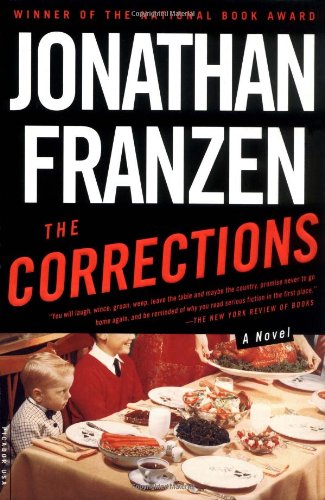Family Dysfunction: A Review of The Corrections
 For years, I have heard about Jonathan Franzen, and particularly two of his novels, Freedom and the Corrections. They were two books which, if you went to any Barnes and Noble, you would find on a table in the middle of the aisle or on the first set of shelves in a series of shelves or on an end cap propped up prominently for all to view. Such placement is honor reserved for few novelists and denoted the special set of skills Jonathan Franzen possessed as an author. At one point, I had heard that Oprah had selected one of the books as one of her book club selections or some similar honor. (I have recently discovered that there is some controversy over such honor though that its existence really has no bearing on this review.)
For years, I have heard about Jonathan Franzen, and particularly two of his novels, Freedom and the Corrections. They were two books which, if you went to any Barnes and Noble, you would find on a table in the middle of the aisle or on the first set of shelves in a series of shelves or on an end cap propped up prominently for all to view. Such placement is honor reserved for few novelists and denoted the special set of skills Jonathan Franzen possessed as an author. At one point, I had heard that Oprah had selected one of the books as one of her book club selections or some similar honor. (I have recently discovered that there is some controversy over such honor though that its existence really has no bearing on this review.)
Both Freedom and the Corrections are tomes, extremely lengthy as modern novelist are wont to be. Seemingly, the longer the novel, the more prestigious it is. See for example the Goldfinch and the Luminaries as example, both of which were selected for elite prizes. Accordingly, I jumped at the chance to purchase the Corrections at a discount when offered by the Barnes and Noble online store.
Until recently, I let the book sit in my library gathering digital dust until I had the time and motivation to read it. Such a chance arose this past New Years when I had the opportunity to spend a week away from work without worry.
The Corrections does not really stand out as book. Its premise is similar to many modern writers, a dissatisfaction with the prior generations world views and cynical perspective of the function of family. The main characters of the book are a married couple and their three adult children, each of who have chosen their own unhappy paths and who are all themselves dissatisfied and unhappy just like their parents.
The Corrections, it seems echoes so much of the literature that has been written. A few books I have read came to mind when reading it. For example, Franzen explores a theme of the older mentor exploiting the younger student, not once twice, a theme explored in Blue Angel, a National Book Award Finalist, written by Francine Prose. The theme of the dysfunctional family has been explored in such books as the Family Fang by Kevin Wilson, the Position by Meg Wolitzer. To this existent, the Corrections is not original or terribly creative.
The one thing Franzen seems to do well, perhaps to well, it to tie the theme of correction into the book. The first movement of the book involving one of the sons discusses his loss of his professorship and failure to write anything of significance and transition into a life of international. He has sent a manuscript to an agent who, rather than review it, gives it to her young child to use as coloring paper. He feels he must correct a first scene in his script.
In subsequent sections, we discover the other son is a married man who constantly battles with his wife, feels like his whole family is after him in a paranoid delusion, and argues with his father about company and family loyalty. He attempts his correction by capitalizing on some insider information based on a old patent of his father’s which another company is now attempting to buy the rights to.
The brothers’ sister is a chef who is dating a married man. She is one who has long sordid sexual history involving older men who served as her mentor.
The father is senile but uncompromising. The mother is resilient but loyal. She possessed a promising future in finance but, due partly to self-imposed values and due partly to the strange values of her pessimistic husband, she released that promising future to raise the three children. She deludes herself into believing everything is okay when she knows it is not.
Throughout the book, we see each of these characters trying to correct their mistakes but failing miserably at it. Nothing is resolved. Rather, things seem to devolve and become even more depressingly worse.
These are not unique characters. Rather, they represent stereotypes often relied upon writers and play writes. Simply said, there is nothing special here. Even the language or the story is typical, standard, mediocre at best.
Further, the secondary characters who inhabit the world of the family lead bright and positive lives. And, it is this fact that makes Franzen’s the Corrections somewhat hypocritical. Franzen suggests that the gap between the generations has created the dysfunction, but this message is watered down message. It loses its potency because it seems to apply to only to this one fictional family.
Ultimately, due to the above flaws, the Corrections becomes unworthy of the time invested reading it, time better spent on other more interesting and enterprising books.

Comments
Post a Comment